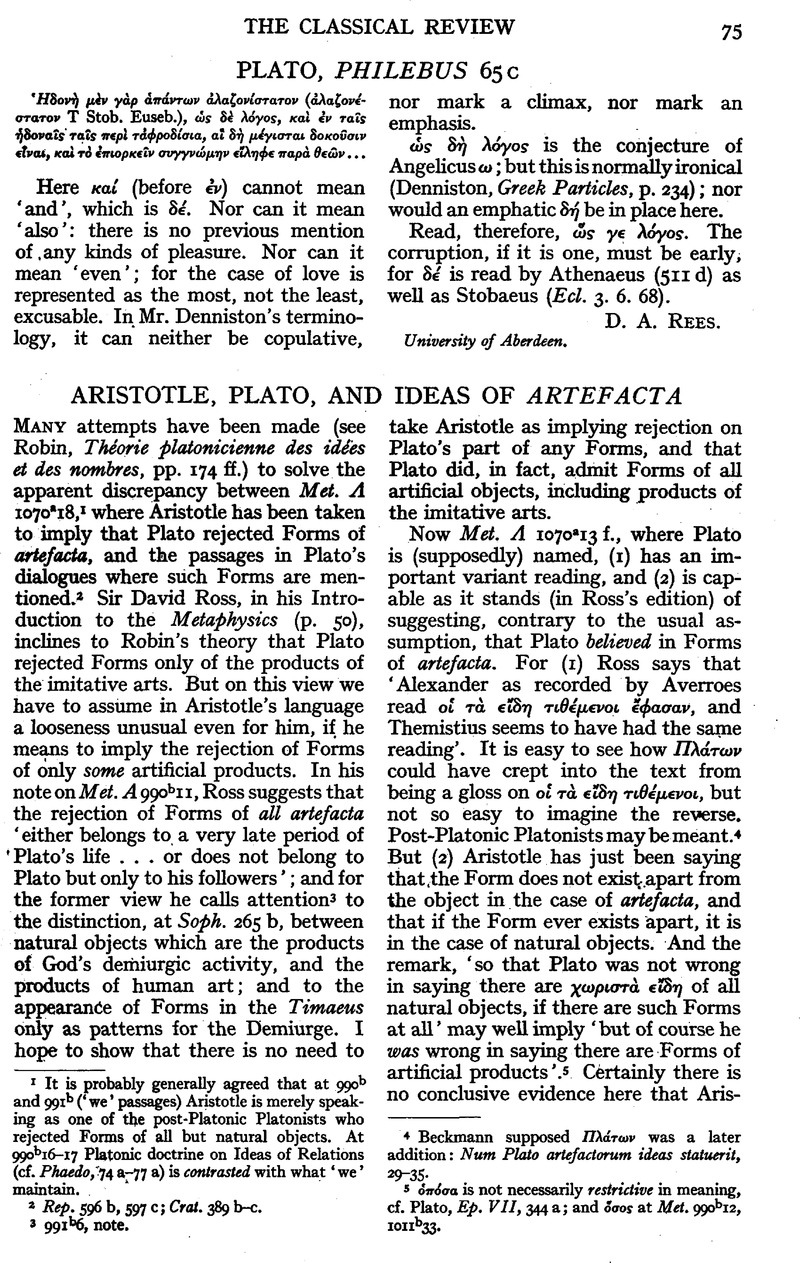No CrossRef data available.
Article contents
Aristotle, Plato, and Ideas of Artefacta
Published online by Cambridge University Press: 27 October 2009
Abstract

- Type
- Review Article
- Information
- Copyright
- Copyright © The Classical Association 1947
References
page 75 note 1 It is probably generally agreed that at 990b and 991b (‘we’ passages) Aristotle is merely speaking as one of the post-Platonic Platonists who rejected Forms of all but natural objects. At 990b16–17 Platonic doctrine on Ideas of Relations (cf. Phaedo, 74 a–77 a) is contrasted with what ‘we’ maintain.
page 75 note 2 Rep. 596 b, 597 c; Crat. 389 b—.
page 75 note 3 9916, note.
page 75 note 4 Beckmann supposed πυάτωνwas a later addition: Num Plato artefactorum ideas statuerit, 29–35.Google Scholar
page 75 note 5 ⋯πόα is not necessarily restrictive in meaning, cf. Plato, Ep. VII, 344 a; and ὅσος at Met. 990b12, 1011b33.
page 76 note 1 Cf. Πλ⋯των μ⋯ν ο$ν … οὕτω διώρισεν, 11. 7—8.
page 76 note 2 Cf. Rep. 596 b.
page 76 note 3 Met. 987b8, 988a12. The statements, too, that the Forms are as many as or not fewer than sensible particulars (990b4–5, cf. 1078bfin.), and that there are Forms π⋯ντων τ⋯ν καθ⋯λου λεγομ⋯νων (1078833–4)almost certainly refer to Plato.
page 76 note 4 e.g. 1033b5–26,1070a13–17.
page 76 note 5 Or, if the text is authentic, Xenocrates' own views may have-had something to do with the choice of the phrase, despite his claim to have obtained Plato's sanction for the definition as a whole.
page 76 note 6 Diogenes Laertius' evidence is self-contradictory: cf. iii. 77 with vi. 53.
page 76 note 6 342 d.
page 76 note 6 See my edition, pp. 174 ff
page 76 note 6 If he did so at ‘a very late period’, to use Ross's words (see above), it was certainly very late indeed: he was seventy-three when the Seventh Letter was written. And on the absence of reference to Forms of artefacta in the Timaeus, Ross himself observes (p. xlix) that ‘Plato does not speak of such Ideas there because he is writing on physics and they would be quite out of place’.
Robin's solution of the problem (loc. cit.), though ingenious, seems to be inferred from Aristotle's own doctrine rather than based on testimony directly concerning Plato.


